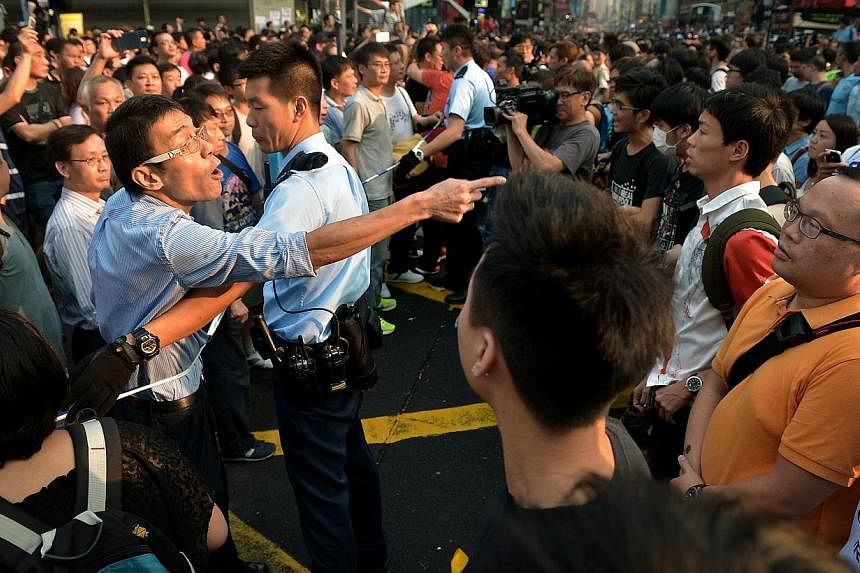A MARRIED couple has been waging a cold war and not been on speaking terms for the past week.
Friends have turned foes - "unfriended" on Facebook and "unfollowed" on Twitter.
A member threatened to quit his association's executive committee after seeing its president "like" a comment on Facebook criticising student protesters.
The Occupy Central movement in Hong Kong not only marks a stand-off between protesters and the Hong Kong and Beijing authorities, but has also become a source of friction throughout society, affecting family ties, friendships and work relationships.
While the sit-in is now flagging, the canker left by conflicts due to strong - even emotionally visceral - opinions will not be so easily removed.
Wall-to-wall coverage, both in mainstream and social media, have further polarised and radicalised views, meaning that the movement has become the one most divisive issue in recent Hong Kong history.
As business administration student Lau Wai Hung, 24, a protester, acknowledges sombrely, even after this strife ends, "Hong Kong will not be the same again".
Already, counselling hotlines in the city are being flooded by distress calls.
A family counselling centre told The Straits Times it has received 108 calls relating to the movement since the protest started 11 days ago - a record number for a single issue within such a short period of time.
About a third of these are related to quarrels or broken relationships with families, lovers or friends, said Ms Paulina Kwok, centre supervisor of the Caritas Family Crisis Support Centre.
"We recently received a call from a girl, who said she is considering breaking up with her boyfriend due to major quarrels over the movement.
"She had complained to her boyfriend about the inconvenience caused to ordinary people such as herself who need to get up earlier for work, but he accused her of being short-sighted and insisted that the sit-in was right and necessary for Hong Kong's future."
Another person rang for support, depressed that he and an old friend of over 20 years have not spoken in recent times due to differing opinions on the movement.
Ms Kwok said that this is the first time a single topic has triggered so many disputes among Hong Kongers especially between close ones, since the hotline was set up in 2001.
"Usually friends or families do not discuss such topics, but this time, it is different as newspapers and TV stations have non-stop coverage, and no one can run away from it."
Saying that the situation has reached "a critical point now", she is worried about Hong Kongers being divided into either camp. "Whichever stance you take, you feel a lot of pressure and are unhappy as you may be opposed to people who used to be close to you."
She called on Hong Kongers to be more tolerant and open to others' opinions.
Right now, says sociologist Lui Tai Lok, the movement is at a stage where there is a lot of "finger pointing and arguments". What matters in the long run is how it concludes. "The way it wraps up will shape how people will continue the conversation."
For now though, things are tough, said accountancy student Kaytal Wong, 23, who was actively involved in the protests.
On Sunday night, a quarrel broke out between him and his mother who objected to his participation due to fears about his safety as well as the belief that what the students are doing "cannot change the reality".
"She cried in the living room, I cried in my room," he recalled. "I was very depressed."
Since then, he has decided to take a step back from the protests. "Family is the most important after all," he said.
Facebook, the most popular social medium in Hong Kong, has become a virtual battlefield, with supporters of the movement switching their profile photos to show the yellow ribbon or umbrella representing it. Detractors post videos or articles that back their views.
The conflict has even spilled into the usually neutral workplace. A businessman in his 40s, who declined to be named, recounted how a fellow member of an association - which both volunteer for - is threatening to quit its committee.
"I told him we need to separate work and politics but he was adamant that if I continue... with my views, there is no point for us to continue working together," said the businessman who is against the protests.
Singaporean and long-time Hong Kong resident Robert Chua, 68, also found that updating his Facebook status to oppose the protest has resulted in some people asking him to "return to Singapore".
"But it's okay, I don't really care about such reactions," he said. "I always believe that we should agree to disagree."
Additional reporting by Pearl Liu

